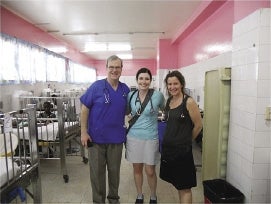When news of the first confirmed Ebola case in West Africa broke in March, Dr. Patricia McQuilken, a University of Massachusetts Medical School doctor working at the John F. Kennedy Medical Center in the Liberian capital of Monrovia, felt confident the virus could be contained.
But her confidence waned when she learned that the disease had made its way to Monrovia after it had spread from a remote village in neighboring Guinea, where a 2-year-old boy had been the first victim.
“When I heard that, I knew it was going to be a huge problem because Monrovia is a densely populated city,” McQuilken said.
She was right. Within months, the virus had spiraled out of control, becoming the deadliest since it first appeared in 1976 in Zaire (now the Democratic Republic of Congo). As of Nov. 14, the U.S. Centers for Disease Control had reported 5,165 deaths and 14,383 confirmed cases.
McQuilken, who is clinical associate professor of pediatrics and director of pediatric global health fellowship and residency training at UMass Medical School (UMMS), had spent several years working to rebuild the Liberian health care system, which had been destroyed by a civil war that ended in 2003.
The work McQuilken and others had done through a consortium of doctors from academic medical centers since 2006 began to unravel as Ebola pushed the medical system to its breaking point. Today, most hospitals are closed and many of the country’s relatively few doctors have died of the disease.
McQuilken, who returned home months ago, once again boarded a plane to Liberia on Nov. 13. Once again, she will work to get the country’s health care system up and running as efforts to curb Ebola in West Africa continue.
These relief efforts are being funded with a $7.5-million grant from the Paul G. Allen Family Foundation, a Seattle-based philanthropic organization that has committed at least $100 million.
The grant will fund three areas of outreach, to be carried out by health care professionals from UMMS and other teaching hospitals. Those efforts include recruiting doctors and nurses to take time off from their regular jobs to work at Ebola treatment centers in Liberia. These assignments typically last a few weeks, but since health care workers are quarantined for 21 days when they return, the time commitment is about eight weeks. The grant money will help pay doctors while they’re off work, so they don’t use all their vacation pay, McQuilken said.
Despite the time commitment and personal risk to healthcare professionals, she said recruitment has been surprisingly easy.
“I’m amazed,” said McQuilken, who said she will be at minimal risk herself of contracting the virus, since she won’t be working directly with patients. “There are a lot of people who really want to go.”
Hospitals in Liberia have closed because of the fear of Ebola transmission and people are dying of other causes as a result. McQuilken said women who need cesarean sections and children with malaria are at particular risk. The plan is to spend two weeks training doctors at each of the country’s 16 hospitals over the next six months. Implementing protocol for triaging suspected Ebola cases is an important part of reopening hospitals safely, McQuilken said.
‘Special responsibility’
Dr. Michael Collins, chancellor of UMMS, discussed the significance of the Allen foundation grant.
“We’re being looked upon by the world to go and help Liberia. That’s a pretty special responsibility,” Collins said.
Of course, it’s no accident that UMMS, along with other members of the consortium, was selected for the task. The previous work UMMS did has created a rapport between its doctors and Liberian officials, and both Collins and McQuilken said that’s crucial to successfully repairing the health care system there.
Just two years ago, Liberian President Ellen Johnson Sirleaf traveled to Worcester to deliver that year’s commencement speech. Collins recalled how appreciative she was of the work UMMS physicians had done to develop curriculum and teach Liberia’s medical school students, and to establish a medical library, and he was humbled that Johnson Sirleaf kept her commitment to deliver the address even though she won the Nobel Peace Prize just a couple of weeks after she was invited.
“For me, it was a very moving experience,” Collins said.
As the Ebola outbreak spread in recent months, Collins said he and his colleagues had a very “uneasy sense” about the Liberian health care infrastructure it had invested so much in. Collins said restoring it will require a significant undertaking, but one McQuilken’s team is up to.
“We teach students … to actually go towards (a) patient who is ill, and now our medical school is going to go towards the country of Liberia,” Collins said.
Collins: Ebola is also our problem
Collins said the Ebola crisis has taught health officials important lessons, prompting an examination of what went wrong in early stages of the outbreak that led to an unprecedented number of infections. He said he hopes that in the future, the world will be better equipped to handle medical challenges.
“It’s one thing to say we’re not going to have Ebola over here … but it is our problem,” Collins said.
In Worcester, the disease hit home when Dr. Rick Sacra, an assistant professor of family medicine and community health at UMMS, contracted the disease. Sacra recovered, and spoke at a Nov. 14 fundraiser at Worcester’s Union Station, which was intended to raise money and awareness to fight Ebola.
The event was an opportunity to show solidarity with members of Worcester’s Liberian community, as well as with UMMS professionals who are working in Liberia, said Tim Garvin, president and CEO of United Way of Central Massachusetts, one of several event sponsors.
For its part, United Way will make a donation to Save the Children, which is providing assistance to children orphaned in the outbreak.
“As much as there’s tragedy, there is also great pride in what we as a community are doing,” Garvin said.

